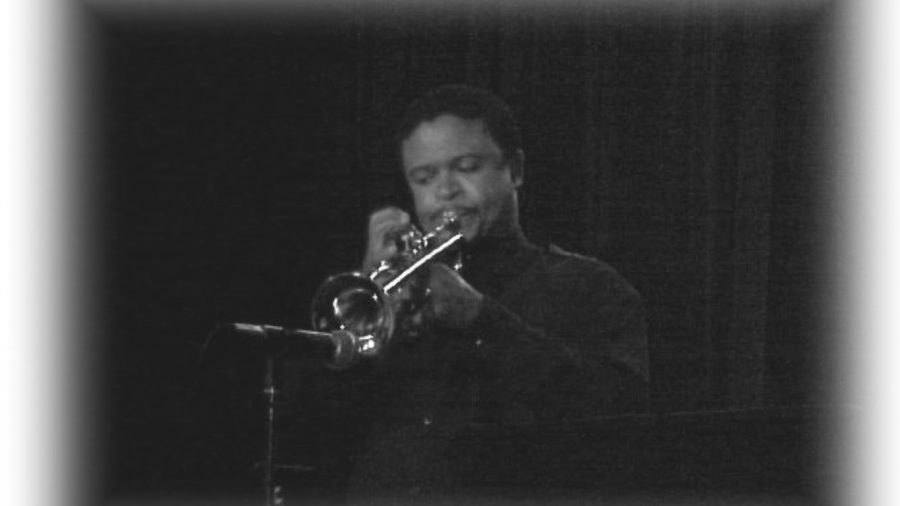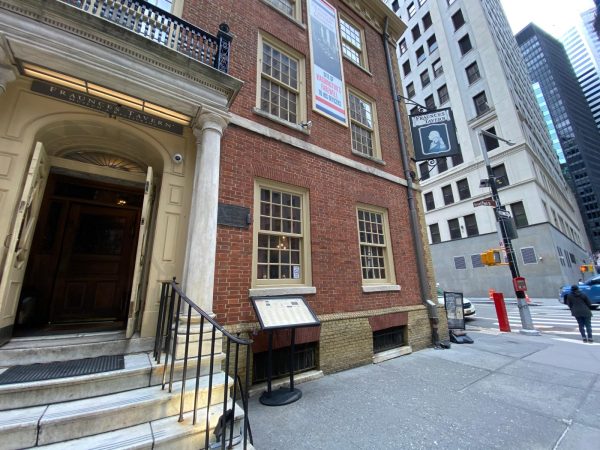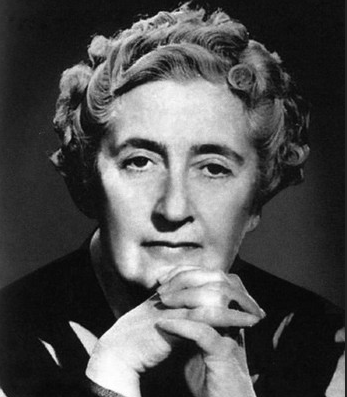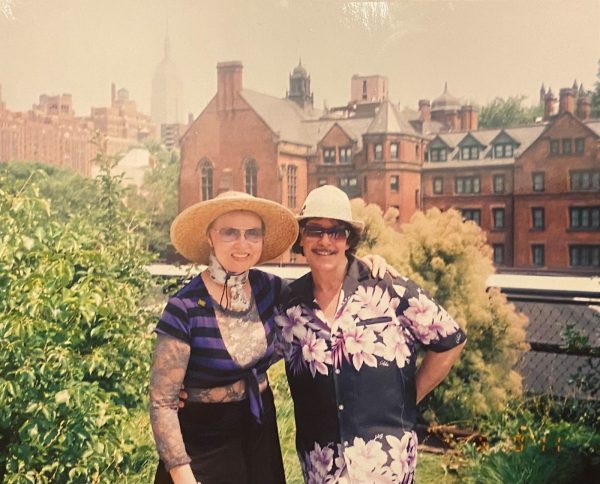Dr. Peter Archer: Finding His Spark in the Classroom
An interview with the Queens middle school band teacher who inspired Disney Pixar’s ‘Soul,’ from a student whom he inspired.
Dr. Archer plays his trumpet in a performance. “I’ve had people come up to me and tell me that the music I played made them feel good. When I perform, the tables shift in a sense that my job is to affect the audience. The music is coming from me and going out to the audience.”
When I was in middle school, I used to find peace in the band room, a bright, blue room littered with photos of students learning to play music. Every Thursday afternoon, when swarms of students would head for the exit, I would head for the band room. As I would wait for the rest of my school’s jazz band to arrive for our weekly Thursday after-school rehearsal, I would sit down, clip my neck strap to my brass alto saxophone, and look over the sheet music.
I was a reserved kid with almost no music background and neither the cadence nor the talent to play jazz — or any kind of music for that matter. I never had confidence in my abilities as a musician, which always led me to question why Dr. Peter Archer, my school’s band teacher, would insist that I play with the best musicians in the school. I would rarely follow up on his offers until he asked me to join the jazz band. As I expected, I was hesitant, scared of playing off-beat and ruining a performance.
However, with the small possibility in my mind that I was as good of a musician as Dr. Archer believed me to be, I took a chance and joined the band. I ended up loving jazz and never once felt that my part was inessential to the band, mainly due to Dr. Archer. He always encouraged me to play, sometimes even telling me to play louder. His faith that I could become a better musician pushed me to reach for an experience I never would have had otherwise.
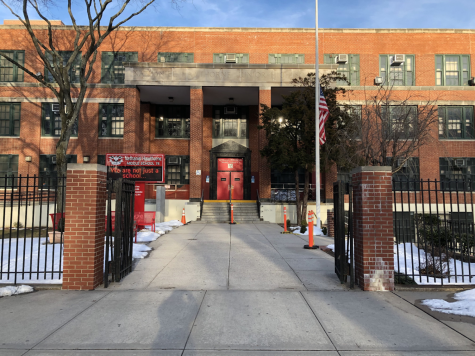
For thirty-four years, Dr. Archer instilled a passion for learning and for music in his students at Nathaniel Hawthorne Middle School 74 (M.S. 74). He and his band students became a staple of the school, holding performances for every event — the Christmas holidays, spring break, and graduation, along with other events. On occasion, he would bring the music from the stage to the classroom to spread holiday cheer and lift the school’s spirit.
When he was not orchestrating performances, he was always tucked away in his band room, leading his class through a new piece, counting the beats out loud and occasionally tapping his battered baton on the crooked music stand in front of him. Little did he know, his job, his dreams, and his passions would become a story grand enough to inspire Soul, Disney Pixar’s latest movie and the winner of the 2021 Golden Globes Best Animated Motion Picture.
Growing up listening to music’s greats, Dr. Archer discovered his passion for music at a young age. “My dad had every single classical symphony — Mozart, Beethoven, Bach. That’s what he played throughout the house, and that’s all I heard growing up,” he said. Dr. Archer became captivated with classical music, like his father, and without his father’s love of music, he may have taken on a completely different career choice.
In addition to his father, Dr. Archer credits his mother as a powerful influence on his musical abilities as she provided him with the needed motivation and support to help push him through any obstacle that came his way. He said, “She took me to Sam Ash [Music Store] and had me pick a trumpet, but she didn’t buy it outright. Instead, she did a layaway. I thought it was so cool and that motivated me to practice.”
However, it was not until he saw his high school’s jazz band perform that he gained the drive for music he has today. “I listened to jazz as a kid, but when I got to high school, I heard the jazz band and I was blown away. It was then that I really started learning improvisation — my blues scales, just everything about jazz,” Dr. Archer said. His passion for playing the trumpet evolved from a hobby to a future. He joined the band, rose to lead trumpet, and after being selected as the feature jazz soloist of the band, went on to help his school win a high school jazz competition.
After leaving high school, Dr. Archer attended Queens College as a performance major, fully intending to become an orchestral musician. However, his decision to pursue such a career was accompanied by many challenges. “In the orchestral realm, the obstacle for me was the lack of racial representation. If you look at the major symphony orchestras — the New York Philharmonic, any of the European orchestras — the minority representation was and has been lacking,” he said.
The lack of diversity he mentions within the music industry, unfortunately, is not a widely discussed topic. According to a report written by the League of American Orchestras in 2016, musicians of color account for less than 15% of all orchestra musicians, with African-American musicians only making up about 1.8% of the musicians. Underrepresentation within the orchestra should be seen as an issue because it could discourage talented musicians from finding their rightful place in an orchestra.
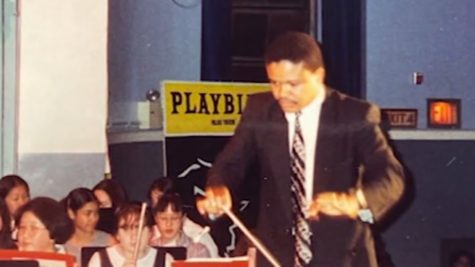
In addition to the lack of representation, Dr. Archer states that simply getting employed to a symphony orchestra was an obstacle in and of itself. “The longevity of these [symphony orchestra] musicians is incredible, so the vacancies are rare. Then, when you do have vacancies, you have about 200, 300 people applying for that, and they are all good,” he said. Like Joe Gardner, the main character of Soul, aspiring musicians looking for their big break often struggle to attain a spot in an orchestra, especially when they are seeking to join the world’s best musicians in the concert hall.
Despite these obstacles, Dr. Archer opted to focus on perfecting his technique, a facet well within his control, instead of choosing to dwell on the hurdles ahead of him. “I figured, you know what, I’m just going to master my art and just be the best that I can be and see what happens. It didn’t hold me back, but it was a reality,” Dr. Archer said.
He went on to master his art, but instead of fulfilling his initial dreams to become an orchestral musician, he became a middle school music teacher. He said, “I was a performance major at Queens College. I didn’t want to teach at all. In fact, I shied away from it. I made fun of music education majors because I thought they couldn’t play. I had this preconception in my mind that kids just fly off the deep end and climb up the walls.”
What altered Dr. Archer’s preconceived notion about music education were the students he met at Marie Curie Middle School 158 (M.S. 158), another local Queens middle school, while teaching on a college internship. He found himself captivated by the surprising ease of teaching and the musical influence he could have on his students. “The band teacher there, Mr. Soma, told me, ‘Look, this is not a big deal. Be consistent with your discipline and know what you’re teaching. That’s pretty much it.’ And that’s what happened,” he said.
His experience in the classroom sparked a powerful realization — one that drew him into the prospect of pursuing a career in music education. “The moment when I got involved in that internship at [M.S. 158], I began to think, “It’s important to teach kids music. There are so many positive things about music that they can take away from it that could impact their lives in so many ways. That was very deep,” Dr. Archer recalled.
“My perspective changed completely to the point where I came there every day instead of three days a week. I took every instrument home. I bought books on how to play the oboe, the bassoon, the French horn, the tuba, and so forth. I learned all the instruments to the point where when I had to take classes on these instruments in college, the professor had me help him teach a class!”
Teaching quickly became second nature to Dr. Archer. On top of his responsibilities at M.S. 74, he would also conduct trumpet lessons at Queens College. “I would be at [the middle school] on Fridays, go to Queens College to do all of my trumpet lessons, and come home at 9:00 [P.M.]. With me, with music, it’s not stressful and doesn’t bother me. I could just do it for 24 hours, and it would feel like 5 minutes,” he said.
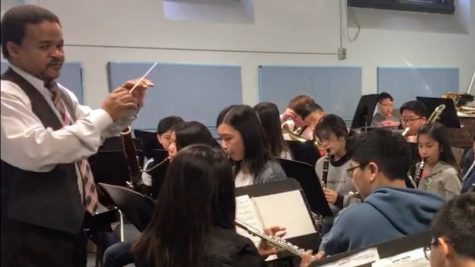
Today, looking back on his journey through life, from listening to music as a kid to introducing music to thousands of kids, Dr. Archer knows he walked down the right path, choosing to become a teacher over becoming an orchestral musician. When considering how his life would have ended up if he chose to become a professional musician, he said, “I would have felt that I was missing something, and that’s what we found in [Soul]. I would have been hired for the orchestra, and then what? When I fell in the sewer at M.S. 158, I found myself helping kids find their spark. Then, I found my spark and continued that for thirty-four years.”
Today, Dr. Archer is still pursuing his passion in both music education and music performance. Even after his retirement from M.S. 74 in the summer of 2020, he continues to provide kids with music education, conducting lessons over Zoom like many other teachers around the world. He also performs in virtual concerts with his own band for holidays and weddings.
Dr. Archer’s story and his continual passion for his students, his music, and his community made him the perfect inspiration and music consultant for the movie. His career, his troubles, and his knowledge of jazz in New York City became important in the developmental process of the movie. “[The directors Pete Docter and Kemp Powers and producer Dana Murray] had read a lot about me. When they came to see me, they were so thrilled because the parallelism was right there. He wanted to play, I wanted to play. He’s teaching band at middle school, I’m teaching band at middle school. He didn’t want to teach, I didn’t want to teach. Then, we both found what’s really important in life, which is helping others find their spark,” Dr. Archer said.
The release of the movie pushed Dr. Archer into the spotlight, garnering him recognition from news channels like The New York Daily News and ABC7, as well as from former students. “I’ve been hearing from a lot of people lately from my first graduating class ’87. They told me how much of an impact I was to them and how when a lot of them were struggling, band helped them to relax and healed them,” he said.
While not particularly basking in the recent spike in attention, Dr. Archer continues to take on interviews and step out of his comfort zone in the hopes of spreading the message behind Soul, a movie he hopes will provide a light amid such dark times. “Celebrity status is not my thing, but given what has been going on in the world now, I wanted to promote the positive message. I hoped that somebody would find something positive and meaningful for themselves that they can apply to make the world better,” he said.
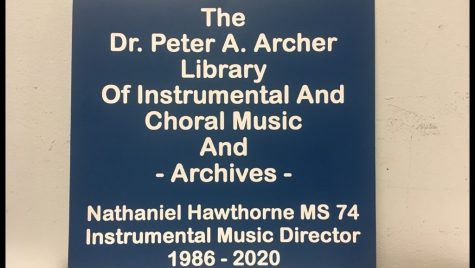
Even without the movie, Dr. Archer leaves behind a long, lasting legacy in his students. While in the classroom, he passes on messages larger than music, telling his kids, “Even though they may not become professional musicians, they would have a sense, in learning music with others, that they could get along. That’s important in the world today especially — how to go about treating people right.” In addition to teaching his students life’s greatest lessons, he sometimes gets to witness his legacy on the stage, performing on the professional circuit with his former students, which he names as one of his proudest moments being a teacher.
To both the young and the old in search of their spark, Dr. Archer offers his words of wisdom: “Influence others, enjoy the passion, embrace the field, and always strive for greatness in whatever it is you are pursuing.”
To watch Soul on DisneyPlus (subscription required), click HERE.
To read a review of Soul on The Science Survey, click HERE.
“When I fell in the sewer at M.S. 158, I found myself helping kids find their spark. Then, I found my spark and continued that for thirty-four years,” said Dr. Archer.
Jillian Chong is an Editor-in-Chief for ‘The Science Survey.’ As a journalist, she loves that she has the ability to voice her opinions and inform...
Cadence Chen is an Editor-in-Chief for ‘The Science Survey.’ She enjoys journalistic writing for its artistic concision and sharp insights. Cadence...

